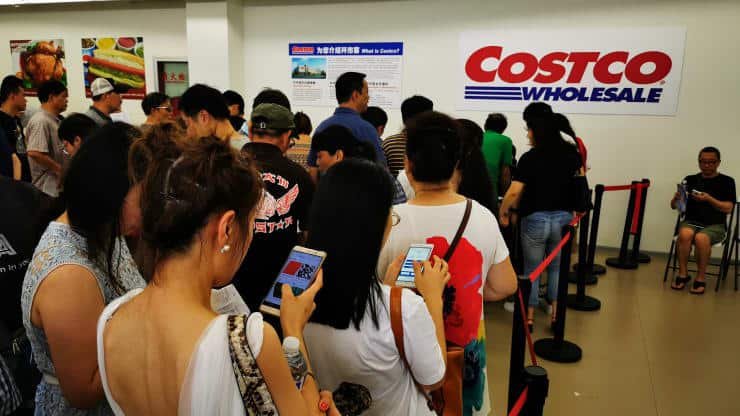
Soon after opening the doors to its first location in China, Costco was forced to shut them, as crowds flooded the store eager to snatch up its discount offerings. It’s a reaction that few Western companies entering China’s retail market have experienced.
Giants like Amazon and Tesco have withdrawn from the country after struggling to gain market share. Analysts believe Costco was welcomed with such enthusiasm because it was able to satiate China’s appetite for new concepts, at a time when its market maturity is ideal.
“They’re an established brand, they’re going into a market that is a well-developed retail market, but that is still hungering for new concepts and new interests,” said Greg Portell, a retail consultant at A.T. Kearney. “It would be very different if they went into Germany or the U.K., where the concept is not necessarily as new, and it’d also be different if they went into … some of the more emerging markets, where the retail environment is not as mature. China presents a great opportunity for them because consumers have a financial base that is mature enough, so you can have that kind of demand.”
Walmart-owned Sam’s Club has operated its wholesale stores in China since 1996, but Portell likened the opening to IKEA’s impact in the U.S., where enough markets have heard about the furniture chain and are fascinated with it, but haven’t had a chance to shop there yet.
“When those stores open in the U.S., they tend to get very strong reactions, because it’s an interesting concept, it’s a mature market, and it’s a market that’s open to those new business concepts.”
Portell said that might explain why other Western retailers like Amazon, Tesco and Carrefour have had trouble entering China. French hypermarket chain Carrefour sold its China business in June after a weak response, and Amazon shut down its China e-commerce marketplace in April. Tesco withdrew from China in 2013.
“Just being the third or fourth store with items on the shelf, that’s not enough anymore. You have to have reasons for consumers to pick you over other options. To do that in a crowded and sophisticated marketplace, you have to have some sort of newness in the concept,” Portell said.
But he also cautioned that consumers being excited on the first day doesn’t necessarily mean the company will see sustainable success.
“It’s one thing to create strong demand and get consumers excited out of the gate, it’s another challenge to run a profitable long-term business in those markets,” he said. “When you think about Amazon or Tesco, the infrastructure and logistics network that are needed to be built up are not inconsequential.”
Gordon Haskett analyst Chuck Grom added that Costco store openings are always met with frenzy.
“Most times Costco moves into a new country, whether it’s been in Australia or Japan, or even France and Spain more recently, the first store openings tend to be wild and successful for Costco,” he said.
That’s why Costco prudently introduced itself to Chinese consumers five years ago, by selling its signature Kirkland products on a Chinese e-commerce site, according to Raymond James analyst Bobby Griffin.
“They were there ahead of time, they got to learn about the Chinese consumer through their e-commerce website, and the Chinese consumer knew about the brand from their other Asia operations in Korea, Japan, and Taiwan,” he said. Griffin also said that there’s a growing middle class in China that are interested in Western goods and items.
Portell said that Costco’s first-day success shouldn’t be discounted. “It’s a lot easier to start with a lot of demand and maintain momentum than to open your doors and have no one show up. It’s the best possible way for them to start off.”

